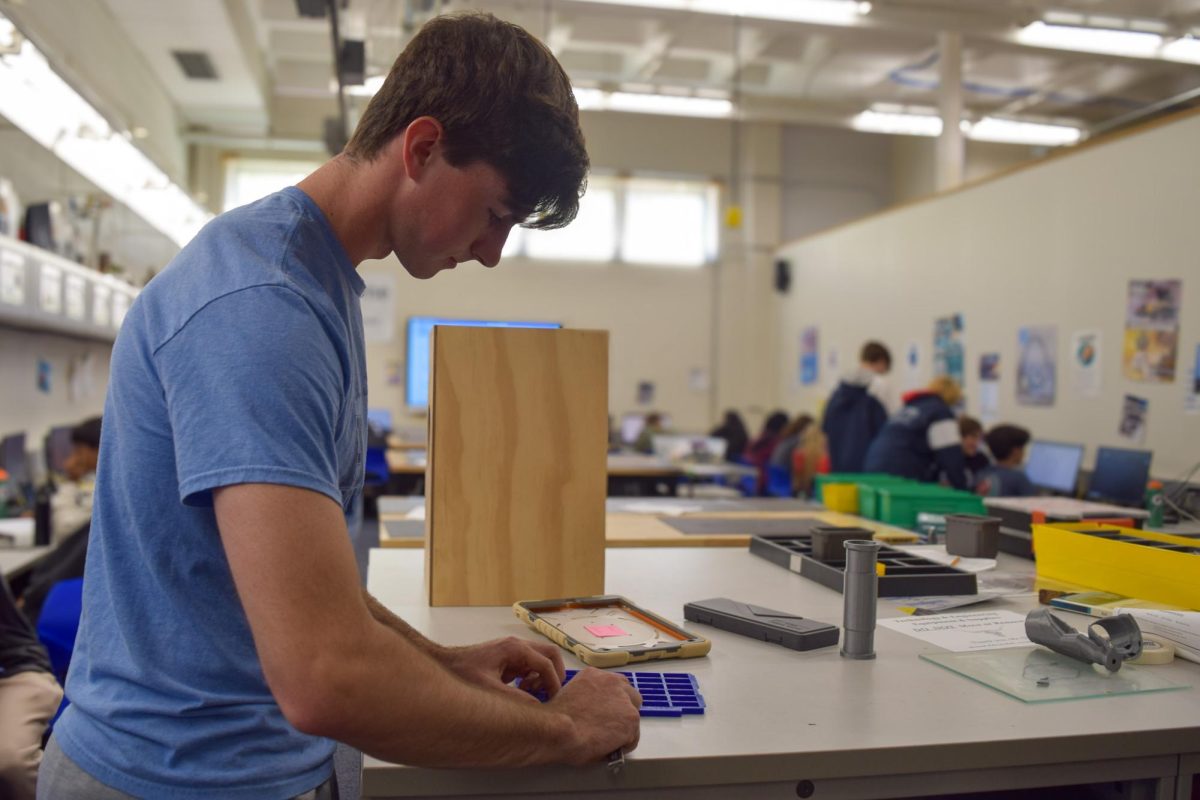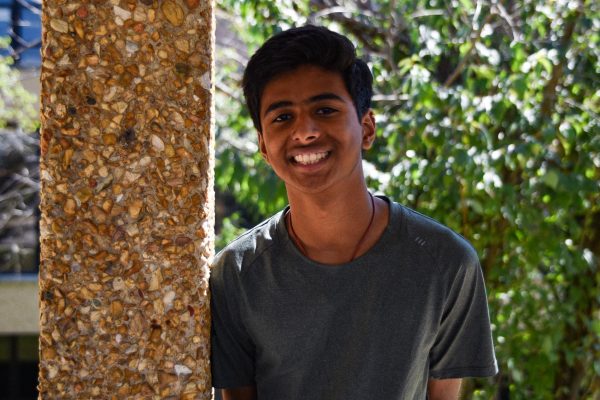Hustling in and out of zoom calls, students are getting involved in the stock market. As the economy takes a downturn and local businesses begin hiring freezes, students like junior Kayvon Rezaei have turned to the stock market to make money and gain economic knowledge.
While not taught in schools, the stock market allows investors to buy and sell stocks of companies in an attempt to earn a profit. The stock market unifies buyers and sellers to trade and purchase parts of publicly owned companies.
“If your stock goes up, especially when you make a really big-brain type of prediction it’s exciting. Even though there’s failure, the room for excitement and success is just so high,” junior Manoah Inje said.
Students have made real profit through trading stocks in the market. Junior Kayvon Rezaei is a short term trader, meaning he buys and sells stocks of a company within a range of days or weeks. He has made about $200 overall from the stock market.
“The overall value of my portfolio fluctuates a lot since I’m a short term trader, but it’s exciting when you make a smart decision and make money off of it,” Rezaei said.
For these students, the first investment didn’t always come from their bank accounts, but from their families.
“My first investment came from my dad a few years ago, but it was very small and I kind of just let it go. But I seriously started investing around midsummer where me and my dad put in a huge sum of cash and started investing in a lot of companies,” Rezaei said.
Despite being self-taught investors, their advice for other budding Warren Buffets is to leverage the numerous online resources which, available for free on YouTube and via the Stock Market Game.
“I feel like there are so many different resources from people who legitimately want to give good information to help others make smart decisions. I also feel like different investing platforms, especially Robinhood, make it easy to get into this area [easy to set up an account online and start trading right away without any commission involved], which used to be so closed off to normal people,” Rezaei said.
Even though investing in the stock market has its ups and downs, Rezaei has found that their decision-making skills have been strengthened after participating in the stock market.
“I remember there was this one gambling company that I invested in. I saw it on Tik Tok so I bought it for 50 cents per share and sold it for 47 cents. That was a bad decision because I missed out on money, but it helped me with my decision making and it set me up for the future trade,” Rezaei said.
The COVID-19 pandemic posed both challenges and opportunities to young traders. For Inje, the pandemic was an opportunity to start trading.
“The pandemic caused several stocks to plummet, which is a great time to invest. So I started to invest in the stock market after the pandemic with the intention to sell my stocks once the pandemic is done and the economy picks up,” Inje said.
The volatility of the stock market during the pandemic increases the risk involved in investing. The stock market is about making predictions and taking a risk that your prediction may be wrong, which Inje says he had the opportunity to learn and manage during the pandemic.
“You have to expect that you lose all of your money and that is the biggest risk. So you don’t want to put your life savings in the stock market. When I started investing with my dad, our goal was not as much to make money but to learn, and losing all of our money was a part of that. However, there is a sense of dread when you see the stock price fall, and you put in a ton of money in it,” Inje said.
On the other hand, Rezaei, who started trading prior to the pandemic, faced huge swings in the prices of many stocks he invested in.
“In February, I invested in some cruise lines, which fell sharply soon after the onset of the pandemic. I invested in GE and the prices rose a couple of days after I made the buy because they were starting to make a vaccine for the coronavirus. The pandemic has taught me to look at those connections between the real world and the stock market,” Rezaei said.
With such a high risk in every decision made, Inje celebrates after making a profit.
“I celebrate after making money most of the time, but the big celebration has to wait till I cash out the trade and withdraw the cash. When you’re investing in something you’ve done plenty of research and [the stocks] go up 100%. It does happen and it’s always a good feeling,” Inje said.
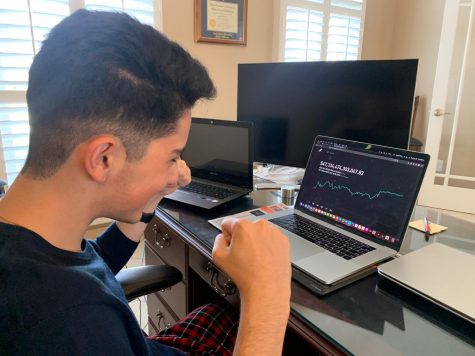
Through trading in the stock market, Inje and Rezvai have developed new skills to apply both in and out of the stock market.
“I’ve been able to apply patience to my life as well, that’s definitely applicable and the stock market made me more aware of how businesses work and how they operate,” Inje said.
Through a combination of learning and earning, students in the stock market have developed real-world skills while building their portfolios for future endeavors.
“It’s very satisfying when you research and make relations between real life and stocks and you see your predictions come true. I make predictions by following current events with an eye and a perspective for how different events would potentially impact the economy. Making predictions and betting on the news is a matter of perspective. It is satisfying because who doesn’t like winning bets,” Rezaei said.



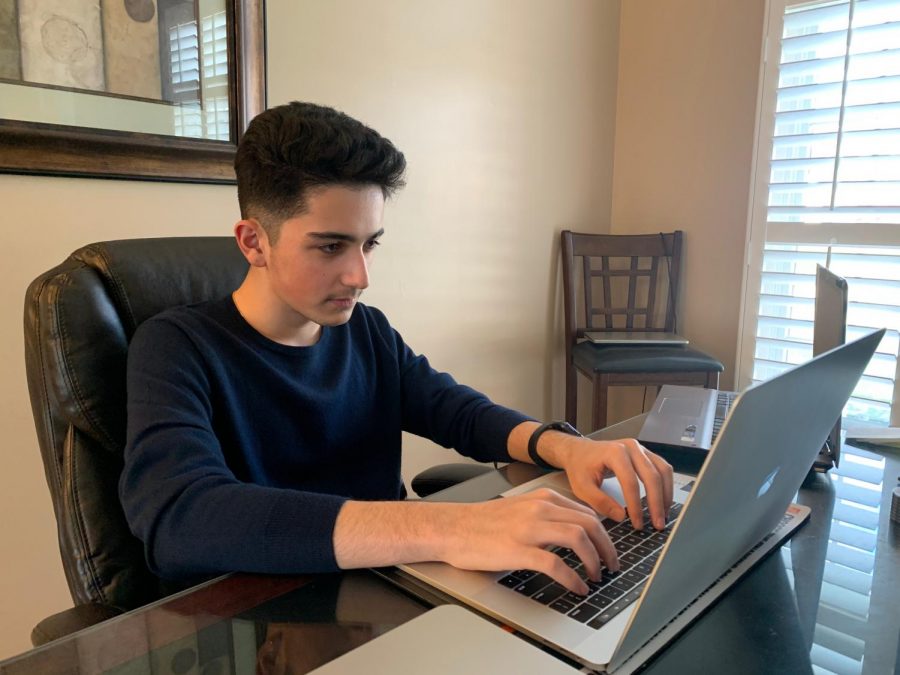
![Focused on providing exceptional service, sophomore Darsh Mahapatra carefully cleans the door of a customer’s car. Mahapatra has always believed his customers deserve nothing less than the best. “[If] they’re trusting us with their car and our service, then I am convinced that they deserve our 100 percent effort and beyond,” Mahapatra said.](https://pwestpathfinder.com/wp-content/uploads/2025/10/DSC_0018-1200x800.jpg)
![Sophomore Aleix Pi de Cabanyes Navarro (left) finishes up a soccer game while junior Ava Muench (right) warms up for cross country practice. The two came to Parkway West High School as exchange students for the 2025-2026 school year. “The goal for the [exchange] program is to provide opportunities for both Parkway students and our international exchange students to learn about other cultures, build connections and become confident, capable, curious and caring — Parkway’s Four C’s — in the process,” Exchange Program Lead Lauren Farrelly said.](https://pwestpathfinder.com/wp-content/uploads/2025/10/Feature-Photo-1200x800.png)

![Gazing across the stage, sophomore Alexis Monteleone performs in the school theater. The Monteleone family’s band “Monte and the Machine” has been releasing music since 2012, but Alexis started her own solo career in 2024 with the release of her first single, Crying Skies. “My whole family is very musical, [and I especially] love writing [songs with them],” Monteleone said.](https://pwestpathfinder.com/wp-content/uploads/2025/09/DSC7463-1200x798.jpg)
![Amid teaching a lesson to her AP Calculus BC class, Kristin Judd jokes alongside her students in their funny remarks. Judd has always enjoyed keeping the mood light in her classroom, along with on the volleyball court. “[I enjoy] that side talk where you see [or] overhear a conversation and chime in, or somebody says something funny,” Judd said.](https://pwestpathfinder.com/wp-content/uploads/2025/09/image-1200x730.jpg)
![Eyeing the ball, junior Ella McNeal poses for her commitment pictures at Clemson University. McNeal’s commitment comes after months of contact with top Division 1 soccer programs. “ It has taken a lot to get to where I am, but I know that [what] I've already been through is just the beginning, and I can't wait for what is to come,” McNeal said.](https://pwestpathfinder.com/wp-content/uploads/2025/09/IMG_4926-1200x900.jpeg)

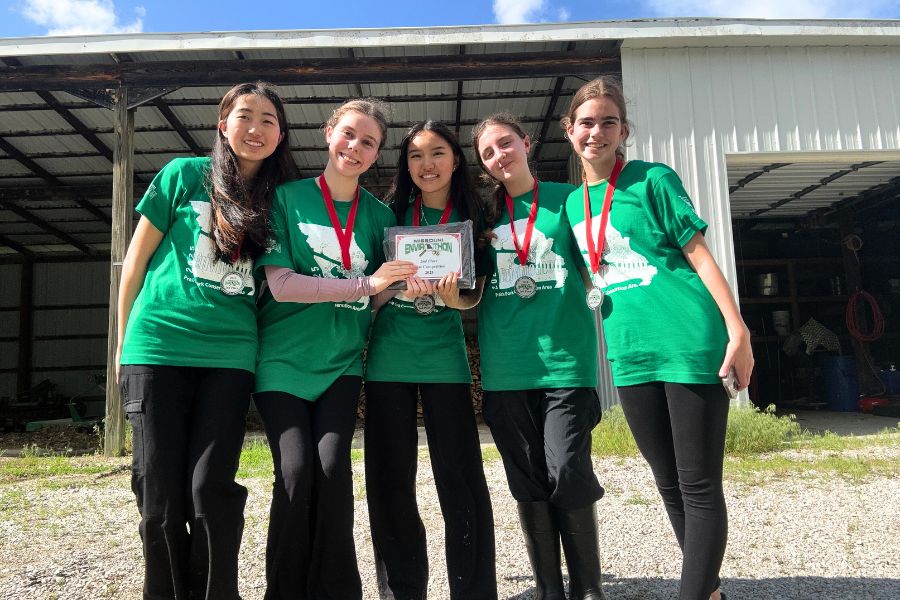
![Senior Adam Zerega stands with senior Dexter Brooks by farm equipment. Zerega often worked with friends and family on his farm. “I've been able to go to my family's farm since I was born. I [spend] at least three weekends a month [on the farm], so I'm there all the time,” Zerega said.](https://pwestpathfinder.com/wp-content/uploads/2025/04/IMG_4872-1200x900.jpg)
